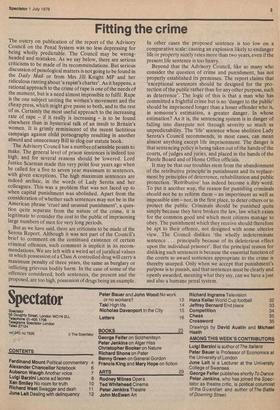Fitting the crime
The outcry on publication of the report of the Advisory Council on the Penal System was no less depressing for being wholly predictable. The Council may be wrongheaded and mistaken. As we say below, there are serious criticisms to be made of its recommendations. But serious discussion of penological matters is not going to be found in the Daily Mail or from Mrs Jill Knight MP and her ridiculous ranting about 'a rapist's charter'. As it happens, a rational approach to the crime of rape is one of the needs of the moment, but is a need almost impossible to fulfil. Rape is the one subject uniting the women's movement and the cheap press, which might give pause to both, and to the rest of us. Certainly the most useful approach to the increasing rate of rape — if it really is increasing — is to be found elsewhere than in hysterical talk of an insult to Britain's women. It is grimly reminiscent of the recent factitious campaign against child pornography resulting in another absurd and unnecessary Bill to clog our statute book.
The Advisory Council has a number of sensible points to make. The general level of prison sentences is indeed too high, and for several reasons should be lowered. Lord Justice Scarman made this very point four years ago when he called for a five to seven year maximum to sentences, with given exceptions. The high maximum sentences are indeed archaic, in the words of Lady Serota and her colleagues. This was a problem that was not faced up to when capital punishment was abolished. Apart from the consideration of whether such sentences may not be in the American phrase 'cruel and unusual punishment', a question quite separate from the nature of the crime, it is legitimate to consider the cost to the public of imprisoning large numbers of men for very long periods.
But as we have said, there are criticisms to be made of the Serota Report. Although it was not part of the Council's brief to comment on the continued existence of certain criminal offences, such comment is implicit in its recom mendations. We are left with a weird set of juridical values in which possession of a Class A controlled drug will carry a maximum penalty of three years, the same as burglary or inflicting grievous bodily harm. In the case of some of the offences considered, both sentences, the present and the proposed, are too high, possession of drugs being an example. In other cases the proposed sentence is too low on a comparative scale: causing an explosion likely to endanger life or property surely rates more than two years, even if the present life sentence is too heavy. Beyond that the Advisory Council, like so many who consider the question of crime and punishment, has not properly established its premisses. The report claims that 'exceptional sentences should be designed for the protection of the public rather than for any other purpose, such as deterrence'. The logic of this is that a man who has committed a frightful crime but is no 'danger to the public' should be imprisoned longer than a lesser offender who is, in someone's estimation, a greater danger. In whose estimation? As it is, the sentencing system is in danger of falling into disrepute not through severity so much as unpredictability. The `life' sentence whose abolition Lady Serota's Council recommends, in most cases, can mean almost anything except life imprisonment. The danger is that sentencing policy is being taken out of the hands of the courts, of judges and juries, and placed in the hands of the Parole Board and of Home Office officials.
It may be that our troubles stem from the abandonment of the retributive principle in punishment and its replacement by principles of deterrence, rehabilitation and public protection. 'Retributive' has indeed become a diry word. To put it another way, the reason for punishing criminals should not be to reform them — an impertinent as well as impossible aim — nor, in the first place, to deter others or to protect the public. Criminals should be punished quite simply because they have broken the law, law which exists for the common good and which most citizens manage to obey. The punishment which they receive should therefore be apt to their offence, not designed with some ulterior view. The Council dislikes 'the wholly indeterminate sentence . . . principally because of its deleterious effect upon the individual prisoner'. But the principal reason for disliking such sentences is because the essential function of the courts to award sentences appropriate to the crime is thereby usurped. Only when we accept that punishment's purpose is to punish, and that sentences must be clearly and openly awarded, meaning what they say, can we have a just and also a humane penal system.






































 Previous page
Previous page